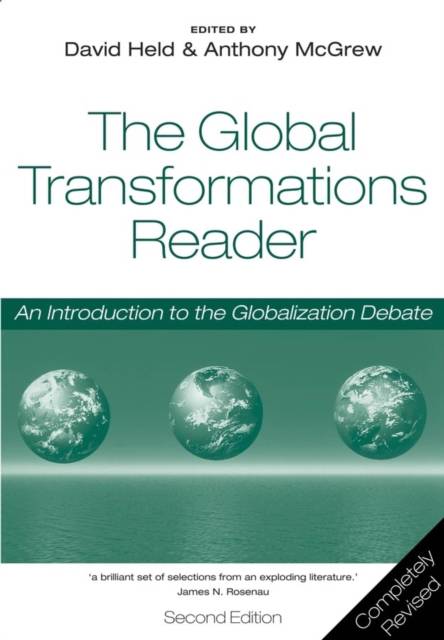
- Retrait gratuit dans votre magasin Club
- 7.000.000 titres dans notre catalogue
- Payer en toute sécurité
- Toujours un magasin près de chez vous
- Retrait gratuit dans votre magasin Club
- 7.000.000 titres dans notre catalogue
- Payer en toute sécurité
- Toujours un magasin près de chez vous
Description
The world is changing dramatically and a vigorous public debate is under way about the nature and historical significance of these changes. At the centre of this debate lie conflicting claims about the extent, form and consequences of contemporary globalization. On the one hand there are the globalists, who argue that the world is being fundamentally and irreversibly transformed by globalization. On the other hand there are the sceptics, who believe that the globalists' claims are exaggerated and poorly substantiated. The sceptics contest the very idea of globalization, arguing that the power of national governments, nationalism and geopolitics remain the determining features of our age.
This completely revised and fully updated edition of The Global Transformations Reader brings together the most original contributions from both sides of the argument and from a range of disciplines. Many new chapters have been added, which incorporate the most recent developments in the debate and set these in the context of a global order that is in a constant state of flux.
Organized as an accessible and comprehensive teaching text, the Reader is divided into six sections covering all the key issues in the debate:
* controversy over the meaning, causes and historical significance of 'globalization'
* the transformation of state power and civil society;
* changing patterns of national culture;
* the power of global markets;
* global inequality and its consequences; and
* the nature of the global order and normative aspirations for its future.
The volume includes an extensive introduction by the editors, reviewing, analysing and assessing the globalization debate. Short but highly informative introductions to each section situate and contextualize the individual readings.
This Reader will be of immense value to all those interested in one of the most important debates of our time. It will appeal to students of politics, international relations, economics, sociology, geography, business studies and cultural studies.
The Global Transformations Reader is part of the internationally acclaimed series on globalization, which also includes Global Transformations: Politics, Economics and Culture and Governing Globalization: Power, Authority and Global Governance.
This completely revised and fully updated edition of The Global Transformations Reader brings together the most original contributions from both sides of the argument and from a range of disciplines. Many new chapters have been added, which incorporate the most recent developments in the debate and set these in the context of a global order that is in a constant state of flux.
Organized as an accessible and comprehensive teaching text, the Reader is divided into six sections covering all the key issues in the debate:
* controversy over the meaning, causes and historical significance of 'globalization'
* the transformation of state power and civil society;
* changing patterns of national culture;
* the power of global markets;
* global inequality and its consequences; and
* the nature of the global order and normative aspirations for its future.
The volume includes an extensive introduction by the editors, reviewing, analysing and assessing the globalization debate. Short but highly informative introductions to each section situate and contextualize the individual readings.
This Reader will be of immense value to all those interested in one of the most important debates of our time. It will appeal to students of politics, international relations, economics, sociology, geography, business studies and cultural studies.
The Global Transformations Reader is part of the internationally acclaimed series on globalization, which also includes Global Transformations: Politics, Economics and Culture and Governing Globalization: Power, Authority and Global Governance.
Spécifications
Parties prenantes
- Auteur(s) :
- Editeur:
Contenu
- Nombre de pages :
- 624
- Langue:
- Anglais
Caractéristiques
- EAN:
- 9780745631356
- Date de parution :
- 01-08-03
- Format:
- Livre broché
- Format numérique:
- Trade paperback (VS)
- Dimensions :
- 170 mm x 241 mm
- Poids :
- 1056 g







